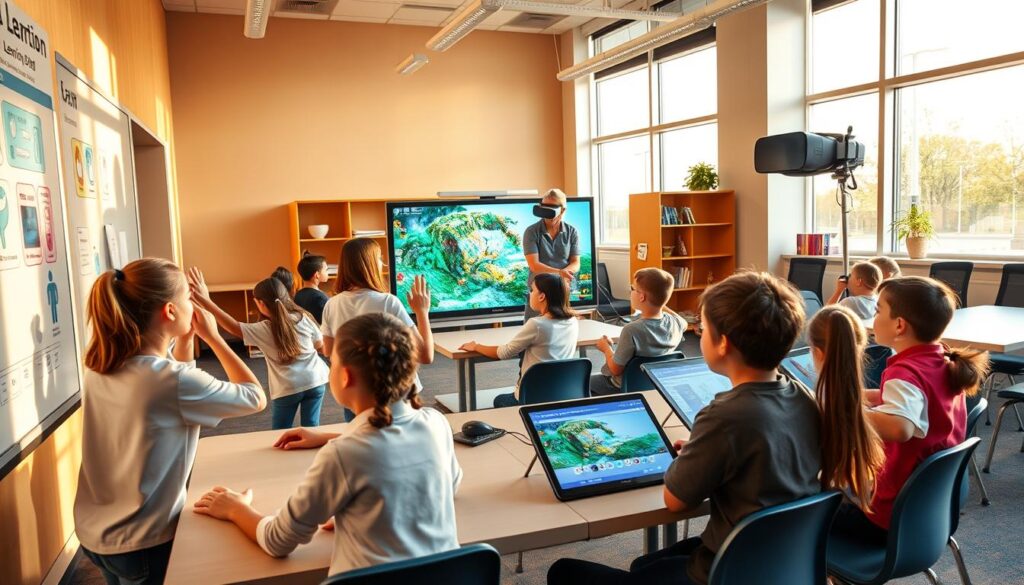Giving your child the best possible start in life is a top priority for parents. A strong foundation in the early years sets the stage for a lifetime of learning and achievement. Quality elementary education programs provide children with the essential knowledge and skills that serve as building blocks for future success.
As a parent, choosing the right education approach for your child can be a daunting task. You want to ensure that their unique learning style and developmental needs are met. A good elementary education not only shapes academic abilities but also fosters social, emotional, and cognitive growth.
In this article, we’ll explore the key aspects of education that can make a real difference in your child’s life, from curriculum design to teaching approaches and long-term benefits.
Table of Contents:
- The Critical Role of Elementary Education in Child Development
- Core Components of Quality Elementary Education Programs
- Benefits of Strong Elementary Education
- Finding the Right Elementary Education Program
- Innovative Approaches in Modern Elementary Education
- Preparing Your Child for Elementary Education Success
- Conclusion: Investing in Your Child’s Future Through Elementary Education
The Critical Role of Elementary Education in Child Development
Elementary education serves as the cornerstone of a child’s academic journey, providing essential skills and knowledge. It is during these formative years that children are introduced to a structured learning environment, where they begin to develop essential academic, social, and emotional skills.
The significance of elementary education lies in its ability to foster a love for learning, establish foundational academic skills, and promote social and emotional development. Research has shown that quality elementary education is correlated with a child’s overall development trajectory, influencing their future academic success and personal growth.
Building Essential Academic Foundations
Elementary education lays the groundwork for future academic achievement by introducing children to fundamental skills in reading, writing, and mathematics. These foundational skills are crucial for future learning and are developed through a combination of instructional strategies and hands-on activities.
- Developing phonetic awareness and reading comprehension
- Introducing basic writing skills and grammar
- Building foundational math skills, including numeracy and problem-solving
Developing Social and Emotional Skills
In addition to academic foundations, elementary education plays a critical role in developing essential social and emotional skills. Through interactions with peers and teachers, children learn important life skills such as self-regulation, empathy, and resilience.
- Encouraging socialization and peer interaction
- Fostering emotional intelligence and self-awareness
- Developing coping mechanisms and stress management techniques
By focusing on both academic and social-emotional development, elementary education provides a comprehensive foundation for future success.
Core Components of Quality Elementary Education Programs
Quality elementary education programs are built on several core components that ensure students receive a well-rounded education. These programs are designed to provide a strong foundation in various content areas while fostering critical thinking and problem-solving skills.
Comprehensive Curriculum Design
A comprehensive curriculum is essential, integrating core subjects like mathematics, science, language arts, and social studies. It should be age-appropriate and build progressively through the elementary years, accommodating different learning styles and abilities while maintaining high standards.
Experiential Learning Opportunities
Experiential learning opportunities, such as field trips, community involvement, and hands-on projects, enhance classroom teaching by providing real-world applications of concepts. These experiences play a crucial role in making learning engaging and effective, supporting equity and social justice.

Benefits of Strong Elementary Education
The benefits of a robust elementary education are multifaceted and far-reaching, impacting students in both immediate and long-lasting ways. A strong foundation in elementary education equips students with essential skills and knowledge that serve as the building blocks for future learning.
Short-Term Academic Advantages
Students who receive quality elementary education experience significant short-term academic advantages. These include:
- Stronger literacy and numeracy skills
- Increased confidence in their ability to learn
- Better preparation for the challenges of higher grades
Research has shown a positive correlation between the quality of elementary education and performance on standardized tests, underscoring the importance of a solid educational foundation.
Long-Term Success Indicators
The impact of elementary education extends far beyond the elementary years, influencing long-term success indicators such as:
- Higher graduation rates and increased college attendance
- Development of critical thinking, problem-solving, and communication skills
- Lifelong habits of intellectual curiosity and self-directed learning
By establishing good study habits and a strong work ethic early on, students set themselves up for success in both their academic and professional careers, ultimately contributing to a more equitable and prosperous society.
Finding the Right Elementary Education Program
With numerous elementary education programs available, choosing the right one requires careful consideration of several key factors.

Accreditation and Recognition Factors
When evaluating elementary education programs, accreditation is a critical factor. Look for programs accredited by recognized bodies such as the Council for the Accreditation of Educator Preparation (CAEP) or the Association for Childhood Education International (ACEI). The Illinois State Board of Education (ISBE) also plays a crucial role in approving programs.
Teacher Qualifications and Approach
The quality of teachers is paramount. Check for their educational background, specialization, and commitment to ongoing professional development. A lower student-teacher ratio often indicates more personalized attention for your child.
Assessing a program’s teaching philosophy and its alignment with your child’s learning style and your family’s values is also vital. Quality programs should meet specific requirements, including curriculum standards and assessment practices. Additionally, consider how the program approaches diverse learners and inclusion practices.
Innovative Approaches in Modern Elementary Education
The traditional model of elementary education is being reshaped by modern teaching methods. As educational landscapes evolve, elementary education is becoming more inclusive, engaging, and effective.
Technology Integration in the Classroom
Technology is being seamlessly integrated into elementary education to enhance engagement and personalize learning experiences. This includes using educational software, online resources, and digital tools to make learning more interactive. By leveraging technology, teachers can cater to different learning styles and abilities, ensuring that every student has the opportunity to succeed.

Multicultural and Inclusive Teaching Methods
Modern teaching practices in elementary education emphasize multicultural and inclusive approaches. These methods prepare students for global citizenship by promoting diversity and appreciation of different cultures. By incorporating diverse perspectives into the curriculum, educators can create a more inclusive classroom environment that values and respects all learners.
As stated by educational expert, “Incorporating multicultural education into the curriculum can have a profound impact on students’ understanding and empathy towards different cultures.”
“When we teach children about diverse cultures, we foster a more compassionate and inclusive society.”
Preparing Your Child for Elementary Education Success
Elementary school readiness is not just about academic preparedness; it’s also about fostering a love for learning and social skills. As a parent, you play a vital role in this preparation process.
Pre-Enrollment Readiness Activities
Engaging your child in pre-enrollment readiness activities can significantly ease their transition to elementary school. Reading together is an excellent way to develop their reading skills and instill a love for books. Additionally, encouraging curiosity and problem-solving through play can help build essential skills for future student success.
Supporting Learning at Home
Supporting your child’s learning at home is crucial for reinforcing what they learn in elementary school. Creating a conducive learning environment that values education and provides dedicated space and time for reading and homework can make a significant difference. Regular communication with teachers and being involved in your child’s educational journey can further enhance their experiences and overall development.
Conclusion: Investing in Your Child’s Future Through Elementary Education
Elementary education stands as a foundational pillar in a child’s educational journey, setting the stage for lifelong learning and achievement. The thoughtful selection of an elementary education program can significantly impact a child’s developmental trajectory, influencing both short-term academic advantages and long-term success indicators.
Investing in education, particularly at the elementary level, yields returns throughout a student’s lifetime, from improved academic performance to enhanced personal growth. Moreover, teacher education and college education programs are continuously evolving to improve teaching methods and education delivery, ensuring that students receive the best possible foundation.
Parents are encouraged to be active partners in their child’s elementary education journey, supporting learning at home and fostering a nurturing environment that complements the school’s efforts. It’s crucial to remember that education at this level is not just about academic content but about developing the whole child, including social, emotional, and physical growth.
The skills and mindsets developed during elementary education serve as building blocks for lifelong learning, equipping students with the tools necessary to navigate future challenges and opportunities. In conclusion, quality elementary education has the transformative power to shape individual lives and society as a whole, making it an invaluable investment in our collective future.

